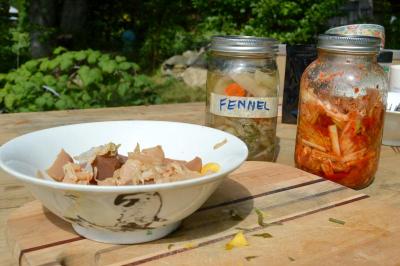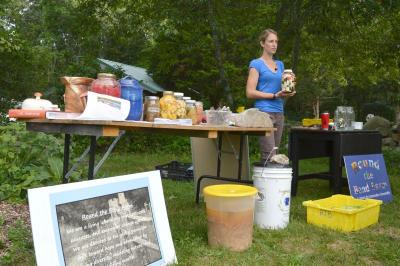Workshop extends the life of seasonal produce
Laura Killingbeck’s workshop on brining produce proved that just about anything in season can be transformed into a tangy treat.
Killingbeck’s class, the first in a three-part series she will be hosting at Round the Bend Farm, offered guidance to those interested in preserving vegetables.
The process involves submerging, sealing and storing vegetables in a salt water solution inside a jar or vessel. The produce will be preserved by transforming the plants’ sugars into acid.
The end result is a tart vegetable that can last for months. It’s a way that consumers can have vegetables regardless of whether or not they’re in season.
Killingbeck said fermentation also comes with some health benefits.
“As you’re doing this process, you’re creating an environment for probiotic bacteria. These are microorganisms that work with your body,” Killingbeck said. “We need these microorganisms in order to have a healthy digestive tract.”
She recommends using fresh produce and said it’s best to select vegetables that are edible in their raw form. During her presentation, she preserved eggplant, peppers and herbs inside a large glass jar.
To create the brine for the process, Killingbeck adds 3 tablespoons of salt for every quart of water. Any kind of salt will work.
“What the salt does is pull the juices out of the vegetables, strengthen the cell walls making them crisper and it will allow you to preserve this for a longer period of time,” she said.
When jarring vegetables, she said it’s important to ensure that all of the produce is completely submerged beneath the surface of the brine.
“The presence of oxygen will cause mold spores to develop, and your food will rot. You do not want oxygen in this process,” she said.
Once the veggies are submerged, she suggests an airtight top to seal the jar. The container should then be stored in a cool, dry place, ideally below 60 degrees. Gas will form during fermentation, which needs to be released every day for the first few days of the process.
“At the beginning, it’s important to release the pressure. But after a week or so, you can safely store this in a cool space and not worry about that gas exchange,” Killingbeck said.
As to when the fermentation process is complete? That comes down to a matter of taste, Killingbeck said.
Round the Bend Farm, a 39-acre working farm located on Allen Neck Road, received its nonprofit status this past July. It was established by the Marion Institute in 2013.
Part of the mission of the farm is to educate others about living off the land. Liz Wiley, education and project manager for the farm, said the group hopes to construct an education center for a more formal classroom setting where they could teach the public and students about food, farming, wellness, permaculture and natural building design.
“We call ourselves a living laboratory,” Wiley said. “There are people living here. We’re eating farm to table. We’re constantly looking at how we can reduce our carbon footprint and how we can give back to the local economy.”
Currently, the farm houses three “agripreneurs” who operate their own businesses out of the farm. There are also open markets held once a month at the location for locals.
Killingbeck works as a season food systems consultant, processing food to carry the residents of the farm through the winter.
She will host two more workshops this fall. The next class, held on Oct. 17, is about brewing live culture sodas. The third workshop, which will be held on Nov. 14, is about kefir.
















